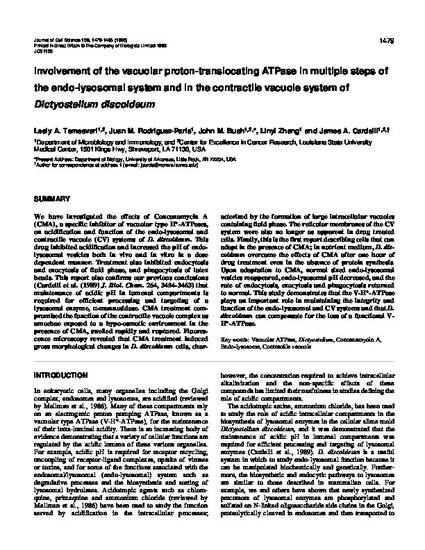
We have investigated the effects of Concanamycin A (CMA), a specific inhibitor of vacuolar type H(+)-ATPases, on acidification and function of the endo-lysosomal and contractile vacuole (CV) systems of D. discoideum. This drug inhibited acidification and increased the pH of endo-lysosomal vesicles both in vivo and in vitro in a dose dependent manner. Treatment also inhibited endocytosis and exocytosis of fluid phase, and phagocytosis of latex beads. This report also confirms our previous conclusions (Cardelli et al. (1989) J. Biol. Chem. 264, 3454–3463) that maintenance of acidic pH in lumenal compartments is required for efficient processing and targeting of a lysosomal enzyme, alpha-mannosidase. CMA treatment compromised the function of the contractile vacuole complex as amoebae exposed to a hypo-osmotic environment in the presence of CMA, swelled rapidly and ruptured. Fluorescence microscopy revealed that CMA treatment induced gross morphological changes in D. discoideum cells, characterized by the formation of large intracellular vacuoles containing fluid phase. The reticular membranes of the CV system were also no longer as apparent in drug treated cells. Finally, this is the first report describing cells that can adapt in the presence of CMA; in nutrient medium, D. discoideum overcame the effects of CMA after one hour of drug treatment even in the absence of protein synthesis. Upon adaptation to CMA, normal sized endo-lysosomal vesicles reappeared, endo-lysosomal pH decreased, and the rate of endocytosis, exocytosis and phagocytosis returned to normal. This study demonstrates that the V-H(+)-ATPase plays an important role in maintaining the integrity and function of the endo-lysosomal and CV systems and that D. discoideum can compensate for the loss of a functional V-H(+)-ATPase.

This article has been published in the Journal of Cell Science. Please find the published version here (note that a subscription is necessary to access this version):
http://jcs.biologists.org/content/109/6/1479